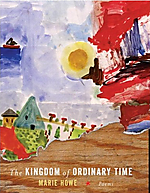The Kingdom of Ordinary Time by Marie Howe

I carried this collection in my purse for whole weeks this summer. Read it in the mornings with coffee. Lived with the poems for a while. Let them spill a bit into my life. Prior to this, and for a while lately, I’ve been reading poetry, when I did read it, mostly online. And it was refreshing for a change to have the whole book. To be able to turn pages. To be able to turn the pages back to a particular poem. To feel the way the poems echo off one another. I like this collection a lot. I anticipated liking it because her previous collection, What the Living Do, was such a knockout. There, Marie Howe wrote about family, about the dying of a brother with AIDS, and about the time after—the book leading up to a kind of epiphany as to what the living do after.
This book is after that. After the epiphany. Ordinary time.
It begins with a prologue:
The rules, once again, applied
One loaf = one loaf. One fish = one fish.
The so-called kings were dead.And the woman who had been healed grew tired of telling her story, and sometimes asked her daughter to tell it.
People generally worshipped where their parents had worshipped—
the men who’d hijacked the airplane prayed where the dead pilots had been sitting,
and the passengers prayed from their seats
—so many songs went up and out into the thinning air . . .
People, listening and watching, nodded and wept, and, leaving the theater,
one turned to the other and said, What do you want to do now?
And the other one said, I don’t know. What do you want to do?
It was the Coming of Ordinary Time. First Sunday, second Sunday.
And then (for who knows how long) it was here.
This prologue, when I first read it, stopped me in my tracks. Like a gate at an entrance to a garden. An arched gateway perhaps. Lovely. Haunting. Both arresting, and beckoning. Both. You want to go forward but at the same time you want to just stop first and look at the gate—soak it in—that experience of being at the gate.
The rules, once again, applied
One loaf = one loaf. One fish = one fish.
The so-called kings were dead.It was the Coming of Ordinary Time.
What I remember about ordinary time as a child (I attended a Catholic grade school) is that it was the time when the holidays were over—and when the priests changed the color of their vestments. After the purple of advent and lent, and after the white of holidays—the green of ordinary time. The time after. Or perhaps the time between.
Marie Howe writes here about going to the market, and the movies. She writes about limbo (Ah, she too must have been raised Catholic. Indeed. Wikipedia tells me she attended Sacred Heart Convent School.) She writes a series of poems in the middle of the book, “Poems from the Life of Mary,” including one about the moon in the well at night. She writes about marriage and prayer and reading novels. She writes about a mother’s body. She writes about loss and about raising a daughter.
My favorite poem right now in Ms. Howe’s collection is, “The Spell.” It’s a poem about two very ordinary (and at the same time extraordinary?) things—about loss and about her daughter riding with her in the car at the end of the school day. I plan to write about that poem next.
Meanwhile, the final poem in the collection is “Mary (Reprise)”. It contains only seven lines. Here are two from the middle, emblematic of this collection, and with the tone set by the first four words:
When I look up my mother is dead, and my own daughter is calling
from the bathtub, Mom come in and watch me—come in here right now!
_________________________________________________________________
See also:
On The Spell by Marie Howe from this site
Interview with Marie Howe at Sound Authors, April 2008
A piece from Wikipedia about ordinary time in the Christian, and especially in the Catholic, calendar—the time after Pentecost and Epiphany—first called ordinary in 1969 after Vatican II. Not because the time was plain (though certainly that must have something to do with it?) but because the weeks were numbered—ordinal.
The poem, After the Movie, from The Kingdom of Ordinary Time, at poets.org
The poem, My Dead Friends, from What the Living Do, at Writing Salon
